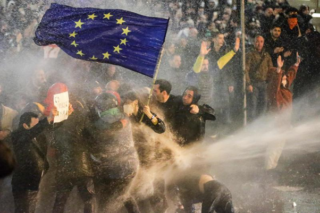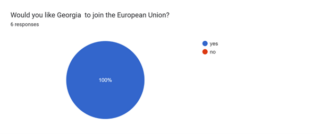
Riots in Tbilisi, Georgia, over the “Foreign Agent Law”; water cannon against pro-European protesters (Le Monde, 18th March 2023).
By Sara De Melas and Alessia Pasqua
It’s the night of March the 7th. The Georgian Parliament has just approved a pro-Russian law. The streets of the Capital – Tbilisi – are crawling with people unhappy and dissatisfied with this Russian-oriented politics. Among them there’s a woman. She is angry at her government, and she definitely has had enough of the Russians. Sick of their long fingers messing with Georgian politics behind the scenes. She lifts up a European Flag and waves it in front of the police. They try to stop her with a water cannon, but she stands up straight.
Her tenacity represents the will to resist the Russian influence, the will of a country that sees its future elsewhere: in Europe. She is a symbol. Nana Malanchkhia, a Georgian civil servant, may not be painted by Eugène Delacroix, but she definitely is the new “Liberty Leading the People”.
“Down with the Russian Law”
The ruling party, Georgian Dream, proposed a draft bill, which passed its first reading on the evening of March the 7th. Few hours later thousands of people took to the streets of Tbilisi protesting in front of the Parliament, chanting at the top of their lungs “Down with the Russian Law”. What was this bill about?
The draft bill would have required all organizations receiving more than 20% of their funding from abroad sources to register themselves as “foreign agents”. A not-so-brazen attempt to silence dissent and press freedom which strongly reminds of a similar Russian legislation, in force since 2012. Accordingly, the “foreign agents bill” has set off more than one alarm bell among those who point out the similarities between other regulations in force in Russia and Belarus.
Josep Borrell – EU High Representative for Foreign Affairs and Security Policy – immediately expressed deep concerns.
The law is “incompatible with the values and standards of the E.U.,” and “goes against Georgia’s stated goal of joining the European Union” he said.
Therefore, the final approval of this bill could have repercussions on Georgia’s accession to the European Union.
Salome Zourabichvili, the President of Georgia, condemned the draft bill in a video address.
“It’s something dictated by Moscow. The Georgia that sees its future in Europe will not allow anyone to take away this future” she stated.
Georgian people came to fear that Tbilisi’s efforts to join the European Union could vanish into thin air. Therefore, numerous demonstrators protested massively in front of the parliament, carrying blue-starred flags and demanding the withdrawal of the law. The iconic video of Nana Malanchkhia, the woman overflooded by water but sustained by other protesters, quickly became viral and came to symbolize the riots. Riot police used both water cannons and tear gas to disperse the crowd, leading to 66 arrests among demonstrators, but also to the injury of 50 police officers. The fear of an authoritarian comeback has been at the doorstep.
Meanwhile, Nika Melia, leader of the National Movement – the only opposition party – has stirred up the protests declaring that they would have least “until victory is achieved”.
“No matter how many times they disperse us, no matter how much gas they use, we will gather again and again, and there should be more and more of us.” Melia announced.
If you look closely, however, there doesn’t seem to be any real support to the protests’ demand of withdrawing the law; what there is, is opportunism.
The party actually aims at the release of its founder and former chairman, Mikheil Saakashvili, arrested in 2021 and detained since then. Exploiting the warmth of the crowd, it seeks to achieve its own goals and interests while actually not helping achieve the struggle’s goals. Eventually, on Friday 10th, the Parliament announced the definitive withdrawal of the bill. The voice of dissent has been heard.
If this choice was well welcomed by the European Union, the same doesn’t go for the Kremlin, whose spokesman accused an alleged “invisible hand” of introducing anti-Russian influences into Georgia. Despite the executive’s concessions, the protests continued to resound for some days, demanding the resignation of the government. For sure they are a powerful demonstration of the willingness of Georgian citizens to join the European Union.
Charles Michel – President of the European Council – stated that:
“The right to peaceful protest is the cornerstone of every democracy” and that “commitment to the rule of law and human values is the key to the EU project.”
Russification of Georgia?
Tbilisi-Moscow relations could be considered a play in two acts. In a general atmosphere of rampant pro-Western sentiment, Georgian citizens took their seats in the audience of the Kremlin’s play many years ago. When the first act began, the Russian invasion of 2008, those pro-European ambitions temporarily froze, preventing Georgia from joining NATO and increasing consensus for pro-Russian parties, such as Georgian Dream, whose main goal is to push the country towards Russia. Then, the second act came; war came.
Last year’s outbreak of war in Ukraine seriously scared Georgia and former-soviet countries. After all, having a close relationship with Moscow is a double-edged sword: on one hand it provides economic advantages, on the other such a strong Russian interference may seriously harm the individual will of these countries. Russia may enter into a tricky spiral of power whose effects could no longer be bearable for the affected countries. The Kremlin’s play is still on stage, but the audience seems not eager to clap.
Georgian (European) Dream?
The Russian invasion of Ukraine marked a turning point: after the attack, 85% of citizens openly favored EU integration, and Georgia formally presented an application for EU membership together with Ukraine and Moldova. Is it a happy ending story then? Not really. Last 24th of June, the European Council decided to grant candidate status to Ukraine and Moldova, but left Georgia stuck in the waiting list.
But what does it mean and what does it imply to be on this list? It means that Georgia will be considered as a candidate to join the community, as long as it fulfills some conditions. Brussels is worried about a political system that is still shaky, essentially oligarchic, profoundly lacking judicial independence and frequently accused of bribery, intimidation and vote buying. Thus the judgment was based on the shortcomings found in the judicial reform and in the fight against organized crime organizations and corruption, considering also the low level of freedom and pluralism.
The European Commission presented Georgia with a list of urgent issues to be addressed in order to see an improvement in Georgian institutions. Those include political polarization, the proper operation of all governmental institutions, and the need for “de-oligarchization“. In the background, the “Russian question” and the alleged low level of freedom and pluralism in the media remain a brake on Georgia’s democratization. The current government, mainly formed by members of Georgian Dream, remains strongly Russian-oriented, as demonstrated by the fact that Georgian did not impose sanctions on Russia after the invasion of Ukraine.
Western-oriented ambitions held back by the Russian grip. Does it remind you of something? Yes, Ukraine.
Georgia and (pre-war) Ukraine: both former Soviet Republics, both “trapped” between East and West, both with a large part of their territory occupied by independence movements supported by Moscow. The comparison between the Euromaidan Revolution in Kyiv (2013) and the current pro-EU protests in Tbilisi just comes naturally. Georgia could become the next Ukraine.
What does the younger generation think about it?
As real social scientists, we went deep into the matter with a survey. It’s interesting to notice how many of the protesters were, actually, youngsters. Their claims are neither motivated by partisan affiliation nor strongly linked to the approval of this specific bill. What drags them into the streets is the strong belief that Georgia should anchor itself to Europe.
Among our six Georgian interviewees, aged between 17-19 years old, four of them actively participated in the demonstrations. Demonstrating that the new generations have clear ideas about the political direction that the government should take.

The willingness to join the EU is widely spread among younger generations, not only because the Georgian membership could represent a rupture with the Soviet past, but also because it could guarantee more individual freedoms and rights.
“We don’t like Russia and its way of life, where you don’t have freedom and basic human rights,” said 18 years-old student Mari.
Determined to follow the path to EU membership, those young protesters feel that the current government is leading them in the wrong direction. With the approval of a similar law, Russian influence would grow even stronger and ultimately suffocate EU aspirations.
“I don’t like our politics, too Russian oriented and violent. Our main goal is to fight against unfairness from our government,” said 17-years-old protester Keso.
Born after the end of Soviet supremacy, young citizens of Georgia have never known their country under somebody else’s control. By contrast, previous generations, raised under the Soviet ruling and still attached to the legacy of that experience – “brainwashed” you might say – are still deeply influenced by the Russian lifestyle and culture. Russia represents the future to them.
“There are older people who think that the Russian system is the right one” said 17-years old protest Atuka.
Jealous of the independence and freedom they’re born with, the youngsters imagine their future in a democratic and equally independent environment as the one of the EU. Asked whether Georgia should join the EU, 100% of our survey participants support the membership.

The benefits of being part of such a community could be security, democracy, and prosperity. So, when looking at the EU, younger citizens not only see a better economic situation, increased political stability and improved life conditions. What they see is a world with more opportunities and less feeling of threat from Russia.
Georgia is still bound to the Russian orbit even if it recognizes the benefits of a potential EU membership. Public opinion is currently stuck in the no-man’s-land between two fronts. The pro-Russia government, supported by older generations, drags towards Moscow, while the new generations drag towards Brussels. They want a truly democratic Georgia, leading the people to Liberty.
